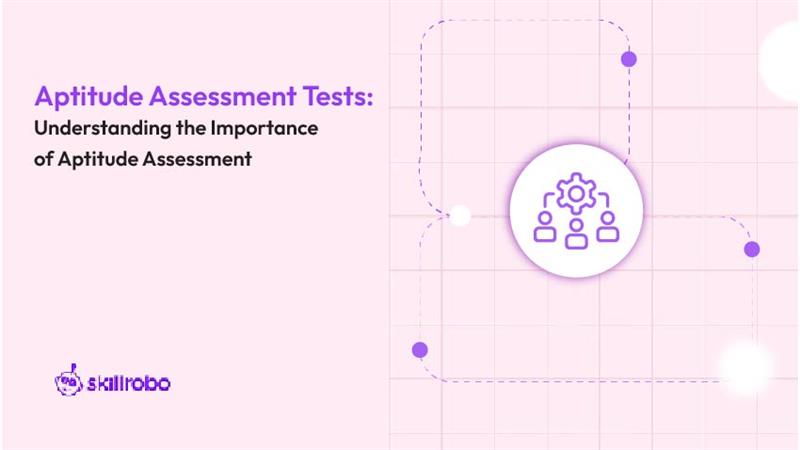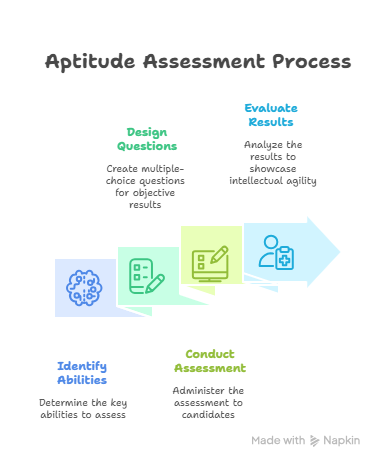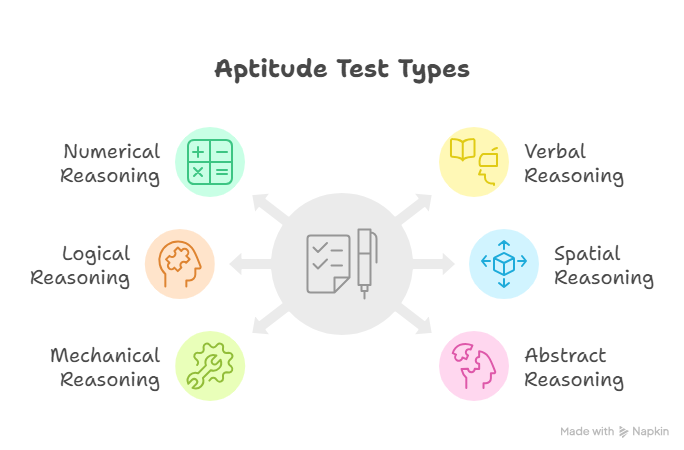Aptitude Assessment Tests: Understanding the Importance of Aptitude Assessment

Key Takeaways
- Aptitude assessment tests are structured evaluations that measure a candidate’s cognitive ability, logical thinking, and problem-solving skills to determine job suitability.
- These tests help employers make unbiased and data-driven hiring decisions by objectively comparing candidates’ capabilities.
- The different types of aptitude tests that assess reasoning abilities include, numerical, verbal, logical, spatial, and abstract assessments.
- Online aptitude testing platforms have transformed recruitment by enabling efficient, accurate, and large-scale candidate evaluation.
What is an Aptitude Assessment Test?
Aptitude assessment tests are designed to assess the capabilities of individuals. These tests can also predict what a person is able to learn or do with the right education and training. The most pressing challenge that HR teams face is hiring the right person for the right job. Although hiring may seem like a straightforward HR task, there are several challenges in finding the right fit for a role.
Recruiters cannot get the complete picture of the candidate’s aptitude and capabilities from the resumes or interviews alone. While resumes and interviews provide valuable insights, they often fail to reveal how effectively a candidate can think, adapt, and perform under pressure. This is where aptitude assessment tests come into play.
In this blog we will delve deeper into aptitude assessment tests, the need for pre-employment aptitude tests, types of aptitude assessments, how aptitude tests help in hiring the right candidates, and what skills do aptitude assessment tests measure.
How Does an Aptitude Assessment Test Work?
What is an aptitude assessment test and how does it work? An aptitude test is not about what a person already knows, it’s about how they think. It measures potential rather than knowledge. By focusing on abilities such as logical reasoning, problem-solving, and decision-making, aptitude tests give employers a deeper understanding of a candidate’s strengths and weaknesses.
In recruitment, aptitude assessment tests serve as predictive tools that determine how well a candidate can learn new skills, respond to challenges, and contribute to business success. For job seekers, these tests are an opportunity to showcase their intellectual agility and learning potential beyond academic qualifications. Furthermore, as organizations continue to evolve toward skills-based hiring, aptitude assessments have become an integral part of modern workforce evaluation.

An aptitude assessment test is a standardized evaluation designed to measure how well an individual can perform certain cognitive or reasoning-based tasks. It provides a snapshot of a candidate’s intellectual abilities, such as comprehension, analysis, interpretation, and decision-making.
Typically, these tests include multiple-choice questions that cover areas like logical reasoning, numerical ability, and verbal understanding. The candidate’s score is then benchmarked against job-specific criteria or industry standards to determine suitability for a role.
Also, aptitude assessments are widely used in recruitment because they offer objective results that are difficult to manipulate. Unlike interviews, which can be influenced by presentation skills or bias, aptitude tests assess actual capability under timed, standardized conditions.
For instance, an organization hiring for a financial analyst role might use a numerical reasoning test to measure data interpretation skills, while a customer service position might focus on verbal reasoning to evaluate communication ability. By using such targeted tests, companies ensure that hiring decisions are based on measurable competencies rather than assumptions.
How Aptitude Tests Help in Hiring the Right Candidates
Aptitude tests are powerful tools that enhance the quality and accuracy of hiring decisions. They help employers move beyond resumes and subjective interviews by providing quantifiable data about a candidate’s potential.
One of the primary advantages of aptitude assessments is that they identify high-performing individuals early in the hiring process. Candidates who score well on these tests are more likely to adapt quickly, handle challenges, and learn new concepts efficiently. What is considered as a good score in aptitude assessment tests? The scores you are expected to get in these tests may vary depending on a number of factors, such as, test type, purpose of test, and the role. For roles that require analytical or technical expertise, these assessments help recruiters identify candidates who possess the cognitive foundation to excel.
In addition to identifying the cognitive skills, aptitude tests also promote fairness in recruitment. By relying on standardized assessments, organizations minimize unconscious bias that can occur during interviews or resume reviews. This creates a level playing field for all applicants, regardless of background or experience.
Moreover, by using aptitude tests as part of pre-employment screening, employers can save time and resources. They can focus their attention on candidates who demonstrate the highest potential, leading to better hires, higher job satisfaction, and reduced turnover rates.
Top Types of Aptitude Assessment Tests Used by Employers
Employers use a range of aptitude tests depending on job roles, industry requirements, and the skills they aim to evaluate. Each test targets specific areas of intelligence and problem-solving.

Numerical Reasoning Tests
These tests measure the ability to interpret data, perform calculations, and draw conclusions from numerical information. Candidates might be asked to analyze graphs, charts, or tables to solve problems. Such tests are common in roles related to finance, data analysis, and engineering.
Verbal Reasoning Tests
Verbal reasoning assessments evaluate how well candidates understand and analyze written information. They test comprehension, grammar, vocabulary, and logical reasoning through short passages and related questions. They are especially important for roles in communication, marketing, law, and management.
Logical Reasoning Tests
Logical reasoning tests assess critical thinking and the ability to identify patterns, relationships, and logical connections between data points. Candidates may need to solve puzzles or deduce outcomes based on given conditions. This test type is often used for management, IT, and strategic roles.
Spatial Reasoning Tests
These tests measure visual thinking and spatial awareness, the ability to visualize and manipulate shapes, patterns, or objects in space. They are widely used in design, architecture, and mechanical engineering fields.
Mechanical Reasoning Tests
Mechanical reasoning assessments test understanding of physical principles like motion, force, and energy. Candidates might need to interpret diagrams or explain mechanical processes, making this test valuable for technical, manufacturing, and engineering positions.
Abstract Reasoning Tests
Abstract reasoning evaluates creative problem-solving and pattern recognition without relying on language or numbers. It measures how quickly a candidate can identify trends and relationships between abstract shapes or figures. This test is useful for identifying innovative thinkers capable of learning new concepts.
Together, these test types give recruiters a multidimensional understanding of a candidate’s aptitude, ensuring a comprehensive assessment process.
Benefits of Using Aptitude Assessment in Recruitment
The use of aptitude assessments offers numerous benefits for both employers and candidates. For employers, these tests bring scientific precision to the recruitment process. They identify candidates who can thrive in complex environments, ensuring that hiring decisions are backed by data and analysis rather than intuition.
A major benefit of aptitude testing is objectivity. Since all candidates are evaluated using the same criteria, the results are fair, unbiased, and easily comparable. This enhances the credibility of the hiring process and supports compliance with equal opportunity standards.
Additionally, aptitude tests are predictive of long-term job performance. Research consistently shows that employees who perform well on these assessments tend to excel in their roles and demonstrate higher productivity. This helps organizations reduce training costs and improve employee retention.
For candidates, these tests offer a transparent way to demonstrate their true potential, especially for those with unconventional backgrounds or limited experience. The tests highlight intellectual agility, allowing capable individuals to stand out based on merit.
What Skills Do Aptitude Assessment Tests Measure
Aptitude tests assess a variety of core cognitive abilities that directly correlate with job success. These include:
- Analytical Thinking: The ability to process information logically and make data-driven decisions.
- Numerical Ability: Comfort with numbers, quantitative reasoning, and basic mathematical problem-solving.
- Verbal Reasoning: Understanding and articulating ideas effectively through language comprehension.
- Critical Thinking: The capacity to assess complex situations, identify patterns, and generate effective solutions.
- Spatial Awareness: Visualization and design-related thinking that supports creativity and accuracy.
Each of these abilities plays a role in determining how quickly a candidate can learn, adapt, and apply knowledge in new contexts. By assessing these skills, employers can better match candidates with roles that align with their natural strengths.
How to Conduct an Aptitude Test for Candidates
Conducting an aptitude test effectively requires clear planning and the use of reliable testing tools. The first step is to define the competencies required for the job role. For example, a marketing analyst position might require strong numerical and verbal reasoning, while a design engineer role may demand mechanical and spatial reasoning.
Employers then select the appropriate test type and determine how it will be administered, either online or in person. Most organizations now prefer digital platforms that automate test creation, delivery, and scoring.
Candidates complete the test within a specified time limit, and their results are automatically analyzed. Recruiters can access detailed reports showing individual scores, comparative rankings, and insights into cognitive strengths. This structured approach ensures accuracy and eliminates human error.
Moreover, by integrating aptitude assessments into the applicant tracking system (ATS), HR teams can easily track progress and make faster hiring decisions based on standardized data.
Skillrobo is an AI-powered pre-employment assessment solution that provides a wide range of aptitude tests for various jobs and roles across industries. From pharmacy to .NET to digital marketing – Skillrobo provides skill assessments that help recruiters make data-driven hiring decisions.
How to Prepare for an Aptitude Assessment Test
For candidates, preparation is key to success in aptitude assessments. These tests can be challenging because they measure not only accuracy but also speed and logical thinking.
Preparation involves familiarizing oneself with test formats and question types. Candidates should practice online aptitude tests that simulate real exam conditions to improve timing and confidence. Reviewing fundamental concepts in mathematics, language, and logic helps sharpen cognitive skills.
Managing stress and maintaining focus during the test are equally important. Candidates should read questions carefully, avoid overthinking, and move efficiently through sections. Consistent practice builds mental agility, improving performance and increasing the chances of achieving higher scores.
Benefits of Using Online Platforms for Conducting Aptitude Assessment Tests
Online aptitude testing platforms like Skillrobo have revolutionized how organizations evaluate candidates. These platforms make testing faster, more reliable, and accessible to global talent pools.
Recruiters benefit from automated scoring and instant analytics that visualize candidate performance through charts and heat maps. This data helps identify top performers quickly, allowing faster shortlisting and decision-making.
Online platforms also provide scalability, enabling organizations to assess hundreds of candidates simultaneously with minimal administrative effort. Advanced security features ensure test integrity, preventing cheating or manipulation.
From a candidate’s perspective, online testing provides convenience. They can complete assessments remotely, receive instant feedback, and experience a seamless recruitment process. This enhances engagement and reflects positively on the employer’s brand.
Why Companies Use Aptitude Tests in the Hiring Process
Companies adopt aptitude tests because they provide measurable insights into candidates’ mental capabilities and potential for success. They enable HR teams to make informed, evidence-based decisions that align with strategic goals.
Aptitude assessments reduce bias, improve diversity, and ensure consistency across hiring teams. They also help predict long-term performance, making them invaluable for leadership, graduate, and technical hiring.
Organizations use aptitude results not only for recruitment but also for employee development, internal promotions, and succession planning. This approach ensures that talent management decisions are guided by data rather than assumptions.
By integrating aptitude testing into the hiring process, companies create a transparent, structured, and future-ready recruitment system that emphasizes merit and capability.
Wrapping Up
Aptitude assessment tests are now a cornerstone of intelligent hiring strategies. Furthermore, online aptitude tests go beyond traditional screening methods to measure a candidate’s thinking patterns, learning potential, and adaptability, which are the qualities essential for success in today’s fast-paced business environment.
For employers, these tests streamline recruitment, improve hiring accuracy, and support data-driven decision-making. For candidates, they offer a platform to demonstrate potential beyond qualifications. As organizations continue to prioritize skills and cognitive abilities, aptitude testing will remain one of the most effective tools for building capable, high-performing teams. Most importantly, HR teams need to embrace pre-employment screening automation tools like Skillrobo that take care of the candidate screening process, so that HR personnel can focus on improving the quality of hires. Ready to explore Skillrobo? Sign up now.
FAQs
What is the purpose of aptitude assessment tests?
They evaluate an individual’s reasoning, problem-solving, and learning potential to determine how well they can perform in a specific role.
How are aptitude tests different from skill tests?
Aptitude tests assess natural abilities and potential, while skill tests evaluate current knowledge and practical expertise.
What types of aptitude tests are most common?
The most common types include numerical, verbal, logical, spatial, and abstract reasoning tests, each targeting different cognitive abilities.
How can candidates prepare for aptitude tests?
Candidates can prepare by practicing sample questions, managing time effectively, and familiarizing themselves with test structures.
Why do employers prefer online aptitude platforms?
Online platforms simplify administration, ensure fairness, automate scoring, and deliver detailed analytics that enhance recruitment efficiency.